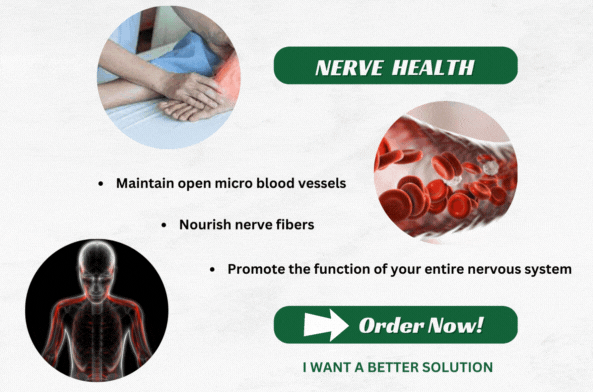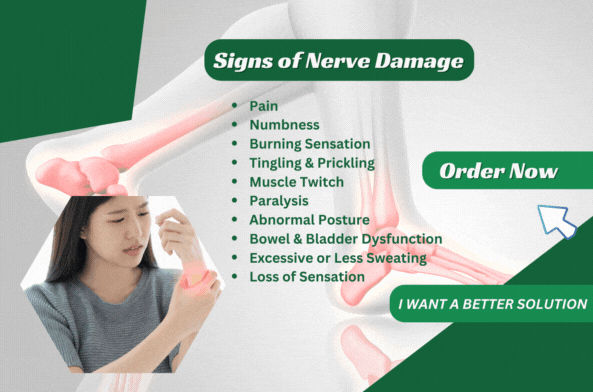Everything your body does, including controlling muscles, breathing, and detecting heat or cold, is influenced by your nervous system.
The body contains three different kinds of nerves:
1. Autonomic nerves. Your body’s involuntary or partially voluntary functions, such as digestion, blood pressure, heart rate, and temperature regulation, are managed by these nerves.
2. Motor nerves. These nerves transmit information to your muscles from your brain and spinal cord, which regulates your actions and movements.
3. Sensory nerves. Your skin and muscles send information to your spinal cord and brain through these nerves. You then experience pain and other sensations as a result of the information being processed.
Your quality of life can be significantly impacted by nerve pain and damage because nerves are necessary for everything you do.
Symptoms of Nerve Pain and Nerve Damage
A wide range of symptoms can be present with nerve damage. Depending on the type and location of affected nerves, you may have more than one. Nerves in your brain and spinal cord can sustain damage. Peripheral nerves, which are found throughout the remainder of your body, may also experience it.
Damage to the autonomic nerve can result in the following symptoms:
- Incapacity to recognize chest pain that could be a heart attack or angina
- Hyperhidrosis, or Excessive perspiration; Anhidrosis, or Insufficient perspiration
- Dizziness
- Dry eyes and mouth
- Constipation
- Sexual dysfunction
- Bladder problems

The following symptoms may be caused by damage to the motor nerves:
- Weakness
- Muscle atrophy
- Twitching or Fasciculation
- Paralysis
The following symptoms may be caused by damage to the sensory nerves:
- Pain
- Sensitivity
- Numbness
- Tingling or prickling
- Burning
- Problems with positional awareness
People who suffer from nerve damage can occasionally exhibit symptoms that point to damage to two or even three different types of nerves. For example, you may simultaneously feel burning in your legs and weakness.
Causes Nerve Pain and Nerve Damage
There are over a hundred varieties of nerve injury. The different kinds might need different kinds of treatment and might present with different symptoms.
An estimated 20 million Americans are thought to be affected by peripheral nerve damage. As people age, this kind of damage becomes more prevalent. Approximately 70% of diabetics have some degree of nerve damage.
The following are some of the potential causes of nerve pain and damage, though they are not all-inclusive:
- Autoimmune diseases. Nerve pain and damage can be symptoms of many different kinds of autoimmune diseases. These include lupus, inflammatory bowel disease, multiple sclerosis, and Guillain-Barré syndrome, an uncommon ailment in which the immune system targets the peripheral nerves.
- Cancer. There are several ways that cancer can harm or cause pain in the nerves. Sometimes malignant tumors can press on or suffocate nerves. In other instances, malnutrition resulting from specific cancer types may impair nerve function. Furthermore, some people may experience nerve pain and damage from specific forms of radiation and chemotherapy.
- Compression/trauma. Nerve pain and damage can arise from anything that causes trauma or compression of the nerves. This includes carpal tunnel syndrome, crush injuries, and pinched nerves in the neck. Find out more about compressed or pinched nerves.
- Diabetes. Nerve damage can affect up to 70% of diabetics, and the likelihood increases as the disease worsens. Diabetic neuropathy is a dangerous side effect that can impact any of the three neuronal types. Burning or numbness are most frequently caused by damage to sensory nerves. You should get medical help as soon as possible if you have diabetes and are exhibiting signs of nerve damage or pain. Check if you are at risk for diabetic nerve pain by taking this assessment.
- Drug side effects and toxic substances. It is possible for a variety of substances to enter the body accidentally or on purpose and result in nerve pain and damage. These include pharmaceuticals, such as some cancer chemotherapies and specific HIV treatments. Nerve pain and damage is frequently caused by long-term alcohol consumption. Your nerves may also be harmed by inadvertently consuming toxic substances like lead, arsenic, and mercury. Find out about additional adverse effects of specific drugs.
- Motor neuron diseases. Your body’s muscles are connected to the nerves in your brain and spinal column called motor neurons. Nerve damage can worsen over time due to diseases that affect these nerves, such as Lou Gehrig’s disease or amyotrophic lateral sclerosis, also known as ALS. Learn more about the various motor neuron disease types.
- Nutritional deficiencies. It is possible for deficiencies in specific nutrients, such as vitamins B6 and B12, to result in nerve damage and pain symptoms, such as burning or weakness. Excessive alcohol consumption and gastric surgery can also lead to nutritional deficiencies that result in nerve damage. View a list of vitamins and minerals that can be found in food.
- Infectious disease. There are infectious diseases that can impact your body’s nerves. These ailments include hepatitis C, herpes viruses, HIV, and Lyme disease. View a slideshow featuring the most prevalent infectious diseases in the United States.
How Are Nerve Pain and Nerve Damage Treated?
There are many cases when nerve damage is incurable. However, there are a number of therapies that can lessen your symptoms. Since nerve damage frequently worsens over time, it’s critical to see a doctor as soon as symptoms appear. In this manner, you can lessen the possibility of long-term harm.
Often, treating the underlying cause of your nerve pain or damage is the first step in the treatment process. This may mean:
- Controlling blood sugar levels in individuals with diabetes
- Treating dietary inadequacies
- Switching prescriptions when they are causing damage to the nerves
- To treat nerve compression or trauma, physical therapy or surgery may be necessary.
- Drugs used to address autoimmune diseases

In addition, your doctor might recommend drugs to lessen the discomfort in your nerves. These may include:
- Analgesics
- Tricyclic antidepressants, such as Venlafaxine (Effexor XR) and Desipramine (Norpramin), along with other antidepressants, such as duloxetine (Cymbalta)
- Some Anti-seizure medications, such as Pregabalin (Lyrica) and Neurontin (Gabapentin)
- Cream containing capsaicin
Alternative and complementary therapies might also assist in reducing your nerve pain and discomfort. These include:

